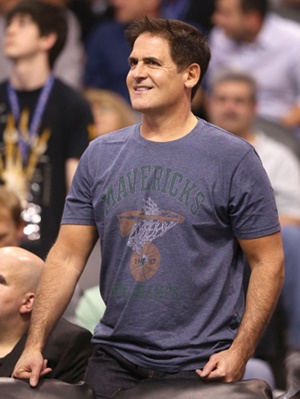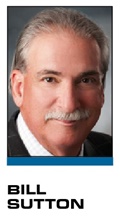I have always had the philosophy that there is something that can be learned from almost anyone or any experience. Thus, I have learned a variety of things from Mark Cuban over the years, some positive and some negative. In terms of the positives, he has:
■ Been the leading voice in fan advocacy and creating a great fan experience and embracing his fans.
■ Pushed the envelope to create new revenue streams and criticized those organizations that stand pat with their hands out waiting for a check.
■ Provided leadership in the technology space, including innovations to improve the fan experience in-venue and at home.
■ Embraced social media and provided his email address to the public.
■ Advocated the importance of sales, and once (I am told) instructed his sales team that they were not selling tickets but “good times.”
I have always offered a sales course or a sales experience as far back as my teaching days at then Robert Morris College. In 1986, USA Today wrote a story about my sales project with the Pittsburgh Pirates and titled the column “Tough Way to Get an A.” I believe sales to be essential to any sports business curriculum, but not necessarily that every student should pursue a career in sales. It is important, however, for all of our students to understand how sales affect sports organizations and how to use sales in other business contexts.
 |
Mavericks owner Mark Cuban is outspoken in his criticism of sports marketing programs.
Photo by: GETTY IMAGES
|
My main issue is with Mark using his platform and popularity to make blanket statements that have shock value and have proved to be hurtful and damaging to some. Recently, in a Feb. 23 post on his Blog Maverick, Mark made the following blanket statement: “Everyone majors in sports marketing. There is no more worthless major.” Wow, Mark? Everyone? Worthless? That statement is offensive to me and the students that I have taught and placed in the sports industry over the past 28 years.
But to be fair, let me comment on some of the other things Mark said about sports management programs. Are there too many sports management programs and too many graduates? Probably. This is a problem for schools and universities and also for the academic organizations that have tried to police the growth and monitor the quality of programs through various attempts at certification. Not all sports business programs or the instructors that teach in those programs are equal. Like anything else in society, the quality is driven by the vision, experience and dedication of the individual in charge. Mark also made the point that sales should be at the core of the curriculum. I couldn’t agree more because selling is the key that unlocks everything else we do in the sports industry.
I have been a thought leader and advocate of industry-based experiential teaching and learning in sports business education, and I have relationships and interact with professors who also integrate their curriculum with the sports industry. Jim Kadlecek at Mount Union University has taught sales for years and has an annual student conference that is also attended by upward of 30 to 40 ticket sales directors each year (many from NBA clubs) who come to recruit. Baylor offers a sports sales major and has worked extensively with professional sports teams in Texas.
Worthless? I think not, but then again not every program believes in integration with the industry.
I am fortunate to be directing a graduate program at the University of South Florida that was created not by the university, but came as the result of an idea and a commitment from the Tampa Bay Lightning to improve its organization. It was the vision of owner Jeff Vinik, CEO Tod Leiweke and COO Steve Griggs to create a program that integrated classroom learning and the new ideas and strategies from an MBA program into the Lightning on a daily basis through students working in what we have defined as a residency.
Students are involved with the Lightning and the team’s goals and objectives and bring those back to the classroom. In some cases, Lightning staffers are adjunct faculty members, helping to teach business analytics and sales. The integration also involves the faculty, who are part of strategic planning sessions, research, training, marketing, event management and sales.
The Lightning financially supports the program and has built a learning lab for faculty and students to use while they are with the team. Each faculty member has office hours at the Lightning not just for our students, but also for Lightning staff members. We have created smaller arrangements with the other pro teams and sports organizations in the Tampa area and, at present, have 30 integrated learning opportunities for our students.
Worthless? I prefer to refer to it as a form of collaborative learning that borders on immersion into education and business by the two partners — USF and Tampa Bay Sports and Entertainment.
To Mark, from all of the sports business programs: Thanks for challenging us. We are far from worthless. We must improve our expectations and elevate our curricula to reflect the changing needs of the sports industry. I have a fond memory, Mark, when you made a comment about the skill levels necessary to work/manage a Dairy Queen. I was impressed when you showed up at the Dairy Queen and worked a shift — that is what a great man would do. So I offer you the same opportunity; come and visit my program. Allow us to share our collaborative educational partnership with the Lightning. If you view it as worthless, I will buy Mavericks ticket plans and donate them to the Dallas Boys and Girls Club. If you find my program has value, perhaps you would consider supporting one student for a year. My email is below. If you are the wise man I believe you to be, I know I will hear from you in the near future. Best of luck to you and the Mavs, and most importantly as you have taught us all, best wishes to your fans for the remainder of the season.
Bill Sutton (wsutton1@usf.edu) is the founding director of the sport and entertainment business management MBA at the University of South Florida, and principal of Bill Sutton & Associates. Follow him on Twitter @Sutton_ImpactU.





